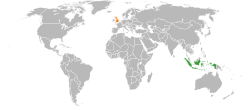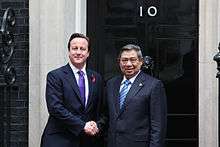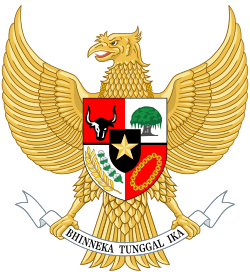Indonesia–United Kingdom relations
The United Kingdom and Indonesia have maintained strong relations since formal relations were established in 1949.[1] Indonesia has an embassy in London[2] while the United Kingdom has an embassy in Jakarta.[3] The United Kingdom considers Indonesia an increasingly important partner globally and is committed to efforts to take bilateral relations to new heights,[4] as well as the humanitarian response to the December 2004 Indian Ocean tsunami, which claimed the lives of 150 British citizens. Both nations are members of G-20 major economies.
 | |
Indonesia |
United Kingdom |
|---|---|
According to a 2013 BBC World Service Poll, 65% of Indonesians view the United Kingdom's influence positively, with only 15% expressing a negative view, which makes Indonesia the country with the second most favourable perception of the United Kingdom in Asia after South Korea.[5]
History
English sailors first reached what is now Indonesia in the 16th century, when Sir Francis Drake reached Moluccas in 1579 on his circum-globe journey. The British East India Company opened a trading post in Bantam on the first voyage in 1601 and imports of pepper from Java were an important part of the Company's trade for twenty years. However, because of heavy competition with the Dutch East India Company, the British trade post in Bantam was closed in 1683. The British shifted their attention to the Indian subcontinent while the Dutch began to establish themselves more firmly in Java and later expanded to most of the Indonesian archipelago.
The British established their garrison at Bencoolen in 1685 and in 1714 built Fort Marlborough in the city. They also established a trading post in Riau, others in the region being the Strait Settlements in Penang and Singapore, while the Dutch wrestled the port of Malacca from the Portuguese in 1641. During the Napoleonic Wars in Europe, the Kingdom of Holland and their colonies in East Indies fell to the French Republic. The British launched a military campaign against Dutch and French hold in Java and establishing British rule in Java. From 1811 to 1815, Indonesia was administrated by the British. Sir Thomas Stamford Raffles was appointed as the Lieutenant Governor of Java in 1811-1816. He was an enthusiast of Javanese culture and history that during his administration he led expeditions that discovered Borobudur, Trowulan and other archaeological sites in Java, subsequently writing The History of Java and publishing it in 1817.[6]
The British and the Dutch signed the Anglo-Dutch Treaty of 1824 which defined the boundary of British and Dutch realms in Southeast Asia and India. The boundaries were later inherited by modern Brunei, Indonesia, Malaysia, and Singapore. The name "Indonesia" was first coined in 1850, when George Windsor Earl, an English ethnologist, proposed the terms Indunesians — and, his preference, Malayunesians — for the inhabitants of the "Indian Archipelago or Malayan Archipelago".[7] In the same publication, a student of Earl's, James Richardson Logan, used Indonesia as a synonym for the Indian Archipelago.[8][9]
The British ruled the Malay Peninsula (British Malaya) and Northern Borneo, while the Dutch controlled Java, Sumatra, and most of the Indonesian archipelago until the Japanese invasion in 1942. During the aftermath of World War II, the Allied Forces led by the British were involved in warfare with Republican Indonesian soldiers and militia during the Battle of Surabaya in 1945. The Indian troops successfully conquered Surabaya on behalf of the Netherlands, but faced some fierce resistance from Indonesian troops and militias.
Again in 1962 the British army and the Indonesian Armed Forces were locked in undeclared warfare in Northern Borneo (Sabah and Sarawak) during the Indonesia–Malaysia confrontation. The Indonesian Sukarno administration was against the British decolonisation initiative on the formation of Malaysia, the amalgamation of the Federation of Malaya (now West Malaysia), Singapore and the crown colony/British protectorates of Sabah and Sarawak (collectively known as British Borneo, now East Malaysia). The British assisted the Malaysian armed forces against Indonesian campaigns and operations on Northern Borneo. With the fall of Sukarno and plagued with internal problems, Indonesia lost their intention to continue the fight and the hostilities ceased. Indonesia finally agreed to the formation of the Malaysian Federation.
After the turbulent years of the 1960s, relations between Indonesia and the United Kingdom have been improving ever since. Because of the importance of English as an international language, the Indonesian government has been promoting the education of English as the most important foreign language taught in Indonesian schools since the 1970s. The British Council was established in 1948 in Jakarta to promote British culture in Indonesia through nurturing the core areas: English, arts, education and society.[10]
In 1974, Queen Elizabeth II visited Indonesia, and became the first British monarch to make an official visit to the country.[11][12][13] In 1989, the Prince and Princess of Wales visited Indonesia.[14] The royal couple visited Sitanala Leprosy Hospital in Tangerang, Taman Mini Indonesia Indah in Jakarta, Kraton Yogyakarta, Borobudur and Bali. The Prince of Wales later revisited Yogyakarta and Borobudur in 2008.
In October 2012, Indonesian President Yudhoyono received the prestigious Honorary Knights Grand Cross of the Order of the Bath awarded by Queen Elizabeth II.[15]
Cooperation

In 2006, the then British prime minister Tony Blair met with then Indonesian president Susilo Bambang Yudhoyono, where they agreed upon "the establishment of a regular Indonesia-UK Partnership Forum to be chaired by the Foreign Ministers, to promote strategic dialogue on bilateral, multilateral and global issues".[1] The first Indonesia-UK forum was held in 2007, and was chaired by British foreign secretary Margaret Beckett and Indonesian foreign minister Hassan Wirajuda.[1]
In March 2010, members of the House of Lords praised Indonesia for their progress in democratising society, media freedom and environmental protection.[16] In a meeting with Indonesian MP Hayono Isman, the Lords stated that they wanted to improve the relationship between the two countries.[16]
In 2010, the Culture and Tourism Ministry of Indonesia launched a campaign to boost the number of tourists from the UK entering Indonesia.[2] In 2009, 160,000 British tourists had visited Indonesia, and the aim of the campaign was to boost this number to 200,000.[2]
Trade and investment
Exports of UK goods to Indonesia in 2010 were worth £438.9 million, an increase of 25% over the previous year, whilst imports of goods to the UK from Indonesia saw an increase of 13% to £1.3 billion.[17] British companies operating in Indonesia include energy giant BP, lenders Standard Chartered Bank and HSBC and tobacco group British American Tobacco, while Indonesian companies operating in the UK are Bank Negara Indonesia.[18]
References
- UK-Indonesia relations
- News-Indonesianembassy Archived 2010-11-26 at the Wayback Machine
- Our embassy
- Linda Yulisman (2013-01-14). "UK sees Indonesia as strategic partner". The Jakarta Post. Asian News Network. Archived from the original on 2013-01-15. Retrieved 31 March 2013.CS1 maint: unfit url (link)
- 2013 World Service Poll BBC
- Sir Thomas Stammford Raffles: The History of Java; Black, Parbury, and Allen for the Hon. East India Company 1817; reprinted in the Cambridge Library Collection, 2010
- Earl, George SW (1850). "On The Leading Characteristics of the Papuan, Australian and Malay-Polynesian Nations". Journal of the Indian Archipelago and Eastern Asia (JIAEA): 119.
- Logan, James Richardson (1850). "The Ethnology of the Indian Archipelago: Embracing Enquiries into the Continental Relations of the Indo-Pacific Islanders". Journal of the Indian Archipelago and Eastern Asia (JIAEA): 4:252–347.
- Earl, George SW (1850). "On The Leading Characteristics of the Papuan, Australian and Malay-Polynesian Nations". Journal of the Indian Archipelago and Eastern Asia (JIAEA): 254, 277–8.
- "British Council Indonesia". British Council Indonesia. Retrieved 31 March 2013.
- https://www.exoticvoyages.com/travel-blog/12-countries-queen-elizabeth-ii-visited-asia/
- http://soeharto.co/1974-03-18-presiden-soeharto-menerima-ratu-elisabeth-ii
- http://baltyra.com/2011/06/03/ratu-elizabeth-ii-dan-indonesia-3-ratu-inggris-pesta-kebun-di-menteng/
- "Travels with Princess Diana". dianaforever.com. Archived from the original on 23 September 2015. Retrieved 22 December 2012.
- Saragih, Bagus BT (October 29, 2012). "SBY to receive honor from UK Queen". The Jakarta Post. Retrieved 31 March 2013.
- Ministry of Foreign Affairs - Members of the UK’s House of Lords praised Indonesia’s achievements Archived 2010-05-21 at the Wayback Machine
- "Indonesia". United Kingdom Trade and Investment. Retrieved 31 March 2013.
- Muhamad Al Azhari (November 29, 2012). "British Companies Upbeat on Indonesia, but See Challenges". JakartaGlobe. Archived from the original on 14 December 2012. Retrieved 31 March 2013.
Further reading
- The British Occupation of Indonesia: 1945-1946: Britain, The Netherlands and the Indonesian Revolution by Richard McMillan. ISBN 0-415-35551-6 / ISBN 978-0-415-35551-3. Google Books

